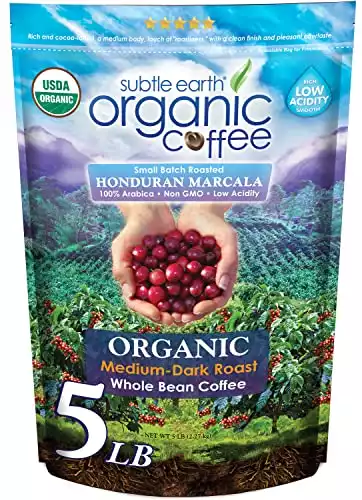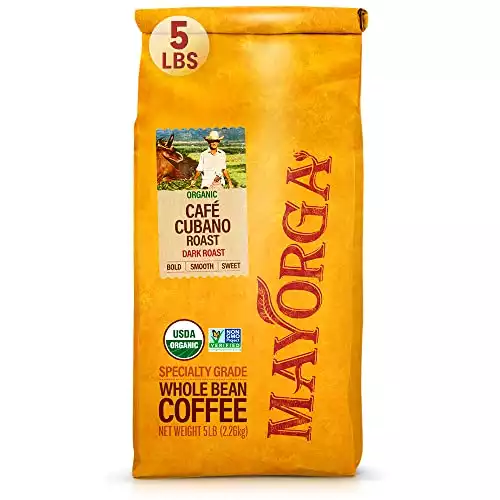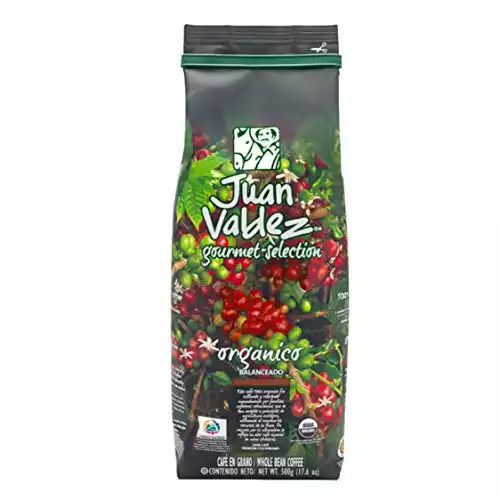What’s the difference between Arabica Vs. Colombian Coffee? Let’s discuss the differences and similarities regarding taste, smell, brewing process, price, and more!
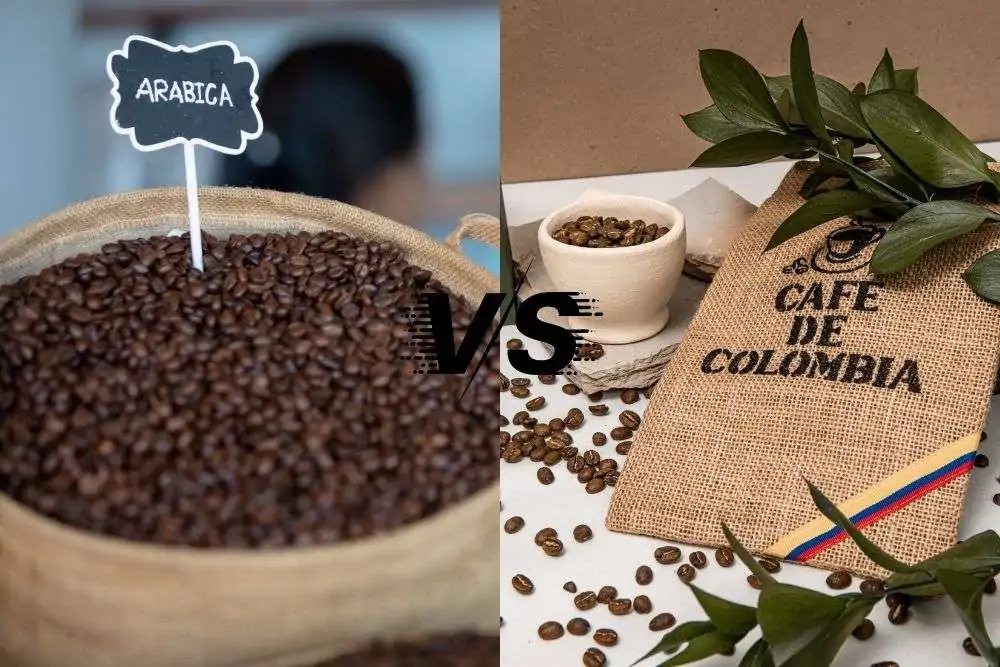
When shopping for coffee, you’ve probably noticed that some of the bags contain 100 percent Arabica beans while others are Columbian. While it’s great that this information is available, it doesn’t really do you any good unless you know what these terms mean.
When it comes to Arabica vs Colombian coffee, which one is better? How are they different?
Let’s take a closer look to see what distinguishes one of these types of coffees from the other.
- What Do Arabica And Colombian Coffee Beans Have In Common?
- What Is The Difference Between Arabica And Colombian Coffee Beans?
- Processing Colombian Coffee
- Why Does It Matter Where The Coffee Is Grown?
- Coffees To Try
- The Final Word On The Differences Between Arabica Coffee And Colombian Coffee
- FAQs About Arabica Coffee And Colombian Coffee
What Do Arabica And Colombian Coffee Beans Have In Common?
Believe it or not, Arabica and Colombian beans are exactly the same. Colombian coffee is just Arabica coffee that’s grown in Colombia.
What’s different about them is the ground in which the coffee shrub grows and the way they’re processed after they’re harvested.
Arabica beans come specifically from Arabica plants. These plants take a full five to seven years to even begin producing coffee beans that can be harvested and sold around the world.
What Is The Difference Between Arabica And Colombian Coffee Beans?
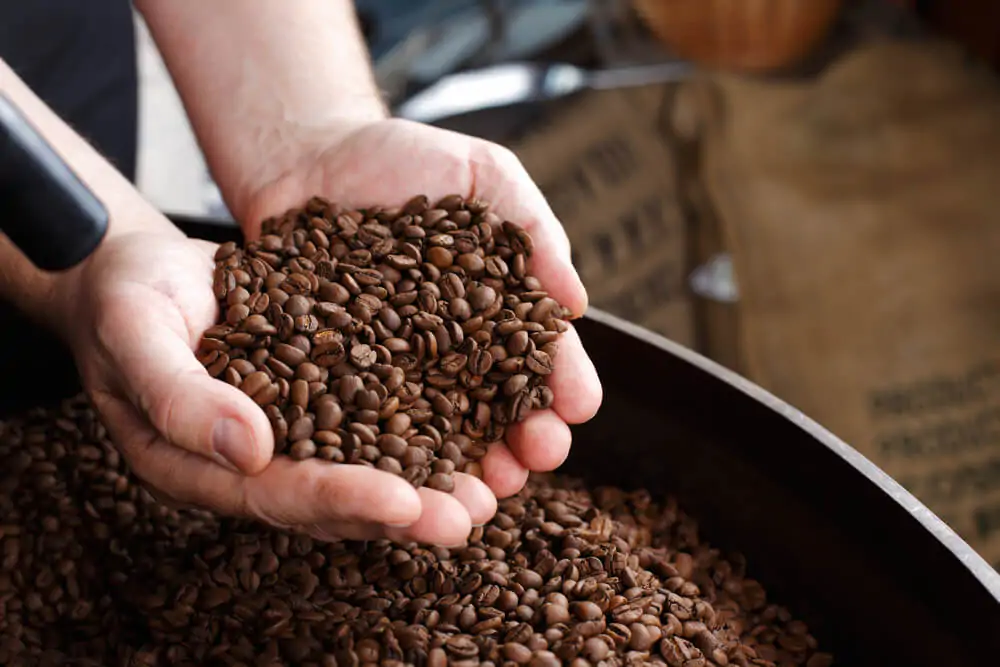
To understand the differences between Arabian and Colombian coffee and why they’re both superior to other types, it helps to know a little bit more about coffee beans in general. There are two types of coffee beans, Arabica or Robusta.
Arabica is more popular, and the flavor is sweeter and milder than Robusta. Robusta is a lower-quality bean because it has a stronger, bitter taste. It also has nearly twice as much caffeine as Arabica. This is why you will sometimes see blends of these two types that balance the flavor of the Arabica bean with the caffeine kick of the Robusta.
You’ve probably tasted Arabica coffee many times in your life if you’re a regular coffee drinker. Arabica coffee can often be described as dark and thick. It tends to be stronger than other comparable bean varieties. Some people do find notes of saffron and vanilla in Arabica coffee.
Many people find Colombian coffee to be very fruity and light. However, there is still a richness that can be observed in every sip. This balance is one of the reasons why Colombian coffee ranks very high on the quality list.
Colombian beans tend to be very aromatic. There’s simply no mistaking Colombian coffee for anything else when you open up a bag of beans! Of course, there’s one other very simple way to know that you’re dealing with Colombian coffee beans.
Processing Colombian Coffee
Colombia beans are just Arabica beans grown in Colombia, but when it comes to Arabica vs. Colombian coffee, there are some differences in processing. Colombian coffee has an additional step that changes the quality of the beans.
You might be wondering what kind of complicated process the beans are put through to make them true Colombian coffee, but believe it or not, the extra step is about as simple as you can get. Colombian beans are washed.
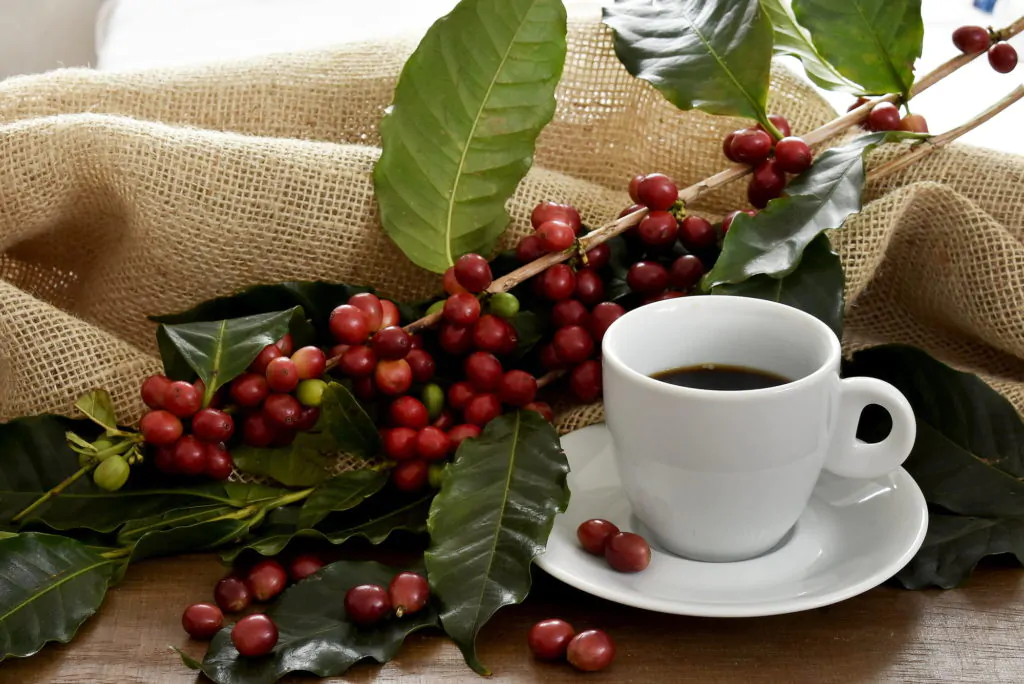
The coffee fruit resembles a cherry, and the beans are actually the pits inside the fruit. When making Colombian coffee, the fruit is picked and mashed, creating a gooey pulp.
This pulp is then washed over many days, using a lot of water. When the pulpy bits of fruit are gone, the beans are dried and roasted.
Traditionally, the fruits are left to dry in the sun, and then the beans are removed when all of the moisture is gone. This gives a much more robust flavor than Colombian beans.
Because there is extra work involved in producing Colombian coffee, it’s usually more expensive. It takes more time, skill, and a lot of water to make. Global warming has had an impact on Colombia’s coffee industry, too.
With the temperature and moisture increasing, the beans aren’t growing as well as they once did, and coffee exports have been declining since around 2006.
Why Does It Matter Where The Coffee Is Grown?
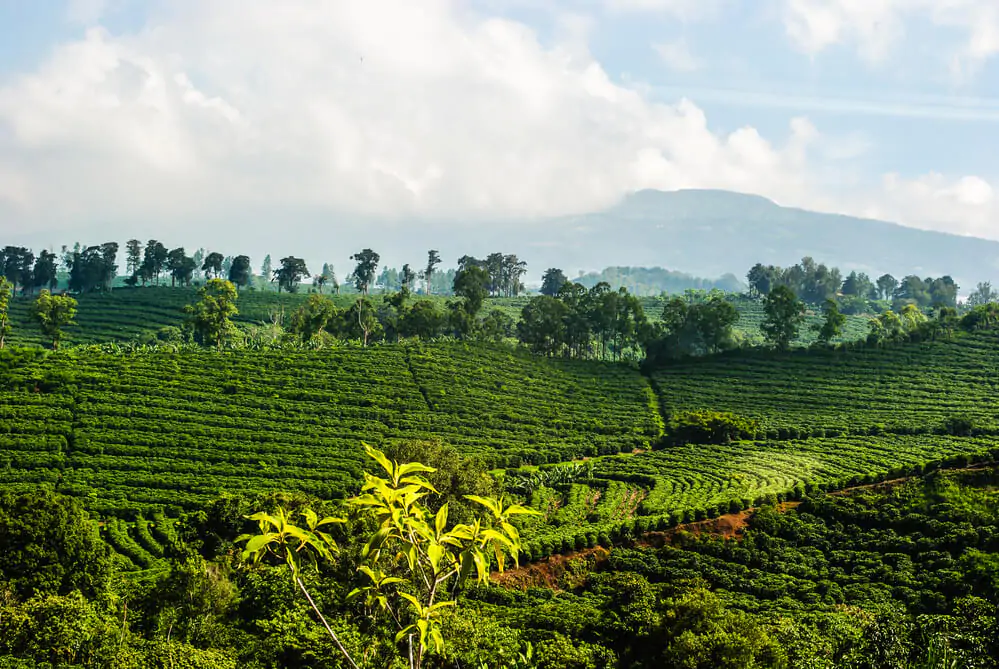
Yes, where the coffee is grown matters a lot. Coffee is grown in what is called the Coffee Belt, which falls between 30 degrees North and South of the equator.
In this region, you get volcanic soil, a moist or humid climate, warm weather, and adequate shade. All of these are reasons why Colombia is one of the best places in the world to grow coffee.
The elevation is also important. The ideal elevation for coffee is about ¾ to one mile above sea level. Many countries have this elevation, but they don’t have the right type of soil.
The other thing to consider when it comes to location is heat and sunlight. Coffee doesn’t do well in direct sunlight. In fact, most plants don’t because too much for too long can burn the leaves and shrivel the plant.
This is why coffee is often grown around other plants that are tall and can give the coffee plant enough shade to protect it from the harsh rays of the sun.
Coffees To Try
If you’re looking for some great Arabica or Colombian coffee, here are some of the best varieties:
1. Subtle Earth Organic Coffee
This dark roast Arabica coffee from Subtle Earth is USDA-certified organic with a rich, chocolatey flavor. It’s low acidity and a deep flavor with hints of cocoa, caramel, and honey and a clean finish and a sweet aftertaste.
Subtle Earth coffee is grown in Honduras in Central America. They don’t use any chemical fertilizers and use the fruits of the coffee bean as compost and fertilizer.
- Organic
- Medium Dark Roast
- Whole Bean Coffee
- 100% Arabica Beans
- Low Acidity
- Non-GMO
- 5lb bag
2. Bones Coffee Company Flavored Arabica Coffee Beans
If you’re seeking something that goes with chilly nights and campfires, this s’mores flavored coffee from Bones Coffee Company is a great choice. It’s made of medium-roast Arabica beans infused with the flavors of toasted marshmallow, chocolate, and sweet graham crackers.
The coffee is roasted in small batches to ensure freshness and is dairy-free, vegan, and keto-friendly. They use beans sourced from Brazil then roasted and packed in the USA.
- Flavored Coffee Beans S'morey Time
- 12 oz Ground Coffee Beans
- Low Acid Medium Roast
3. Mayorga Organics Café Cubano
This is Mayorga’s signature blend, a dark roast with hints of vanilla and sweet smokiness. They use 100 percent organic Arabica beans sourced from farmers in Latin America.
The beans are all hand-roasted in small batches using a special slow-roasting process to draw out distinctive flavors and a smooth finish.
- 5lb Bag
- Organic
- Specialty-Grade
- Non-GMO
- Direct Trade
- 100% Whole Arabica Beans
4. Juan Valdez Coffee Organic Gourmet Whole Bean Colombian Coffee
Juan Valdez is a well-known name in the coffee business, and this certified organic whole bean Colombian coffee demonstrates why. This medium-roast has a mild acidity for a strong, smooth flavor that helps you start your day.
The beans are grown and hand-picked in Colombia using sustainable methods to protect the natural resources and support the biodiversity in the region.
- Organic Gourmet Roast Ground coffee selected with the highest quality standards, with particular characteristics and attributes, which make them unique in flavor and aroma, characteristic of the Colombian brand Juan Valdez.
- This 100% organic coffee was grown and harvested by coffee families that have embraced the principles of organic farming, which gives it a pronounced aroma.
The Final Word On The Differences Between Arabica Coffee And Colombian Coffee
The big secret about the relationship between Arabica coffee and Colombian coffee is that they really aren’t that different. Of course, it’s important to remember that Arabica and Colombian aren’t interchangeable just because Colombian is technically a version of Arabica. We’ll just call these two varieties cousin coffees.
Everyone who enjoys coffee should definitely try both varieties before deciding on a favorite. You may find that Arabica coffee is a perfect choice for your everyday brew because it is so inexpensive and easy to find. That means you can reserve your Colombian coffee stash for slow mornings when you’re in the mood to make some espresso at home.
FAQs About Arabica Coffee And Colombian Coffee
Is All Coffee That Is Wet Processed Colombian Coffee?
No, coffee is not Colombian coffee just because the beans have been “washed” using wet processing. This process is often used for bean varieties other than Colombian. However, only beans that are grown and harvested in Colombia can be called Colombian coffee.
What Makes The Harvesting Process Different For Arabica Beans Compared To Colombian Beans?
Most non-Colombian beans are processed using a traditional method that allows the coffee “cherries” to dry in the sun. The beans are removed only after fully drying. This method does not require any washing because the moisture has already been removed from the fruit.
Can You Mix Colombian Coffee And Arabica Coffee?
There’s no rule that says you can’t mix different coffee types at home. Mixing Colombian with Arabica might seem like an attractive option because it will help to make pricier Colombian beans “go further.” However, the big thing to watch out for is the fact that Arabica beans may simply overpower and bury the flavor of Colombian beans.
Which Parts Of Colombia Grow Coffee?
Most coffee growing takes place in two areas of Colombia. Those areas are the highlands of the Sierra Nevada and the slopes of the Andes.
Which Type Of Coffee Has Lower Acidity?
Colombian coffee generally has much lower acidity than Arabica coffee. This makes splurging on pricier Colombian beans more than worth it if you have a sensitive stomach that is bothered by high-acid coffees.
Does Arabica Or Colombian Have More Caffeine?
Colombian coffee actually has a much lower caffeine value than most other coffee types. Arabica has the higher caffeine content of the two. What’s more, Arabica’s caffeine levels actually continue to elevate after brewing if coffee is left to sit on a warmer for more than 30 minutes.
You might also find our explainer on the difference between coffee beans and espresso beans helpful.
Is It Worth Paying More For Colombian Coffee?
This is a matter of personal preference. However, the specific growing environment and personal attention required to grow and process Colombian coffee are behind its higher price. Many people find that the amazing flavor and quality of Colombian coffee do make the price more than worth it!
Is All Coffee From South America Colombian Coffee?
No, all coffee grown in South America is not Colombian coffee. The only coffee grown and processed in Colombia is Colombian coffee. Some coffee growers do use the Colombian “washing” method when processing other types of beans.
Is Colombian Coffee The Best Coffee In The World?
Some people do consider Colombian beans to be the best in the world. However, the answer is subjective.
Is Colombian Coffee Decaffeinated?
Colombian coffee naturally contains caffeine. However, many coffee suppliers and brands offer decaffeinated versions of Colombian coffee.
Can Colombian Coffee Be Robusta Coffee?
No, Colombian coffee is never Robusta coffee. Colombian coffee is always Colombian Arabica.
Are You Supposed To Add Milk And Sugar To Colombian Coffee?
Yes, Colombian coffee is traditionally served “light and sweet” using milk and sugar. However, you’re free to enjoy your coffee using any combination you choose!
What Is A Cheaper Alternative To Colombian Coffee?
Any type of Arabica coffee will generally be cheaper than Colombian coffee. Something like Arabica coffee grown in Java will offer a flavor profile that is somewhat similar to the Colombian bean.
You can also simply make a Colombian “blend” at home by supplementing your high-quality beans with some cheaper Arabica beans.
